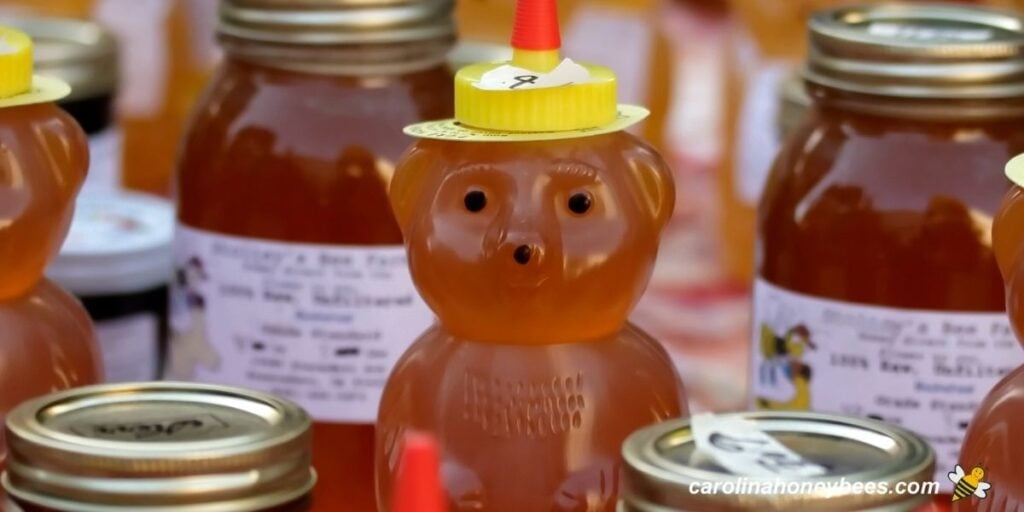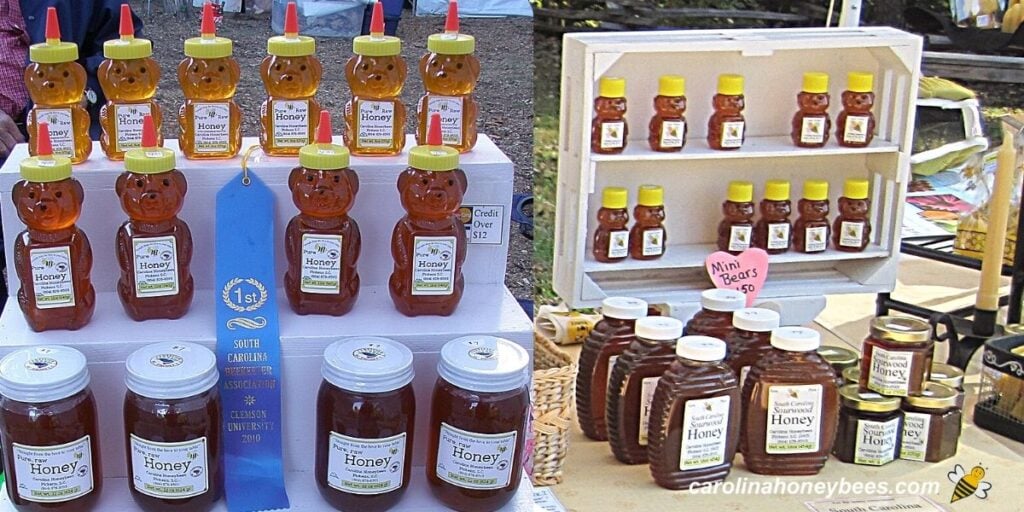How to Sell Honey
Some people approach beekeeping with the idea of producing honey to sell. This is a viable prospect for even a backyard beekeeper with a few hives. Well managed colonies can produce much more honey in a season than a family needs. Understanding the in and outs of selling honey can provide a small stream of income.

New beekeepers are often unaware of how much honey 4 or 5 hives can produce. When the crop exceeds their needs, they find themselves in a bee farm or business situation unintentionally.
Sell Your Honey For a Profit
Is selling honey very difficult? No, good quality honey does a pretty good job of selling itself. However, you do have some things to consider from a practical, legal and financial point of view.
Anytime you are exchanging a product for money, it is important to ensure you are following the rules. And, this is especially true for a product meant for human consumption.
Price Ranges
- discounts
- give it away
- profits
Once our hives begin producing that glorious golden sweetness an amazing thing happens. Friends and family that you haven’t thought about in a long time line up for the friends and family discount.
And hey, that’s okay to a point. It is wonderful to share the crop that your bees have shared with you. However, for the beekeeper wanting to make some income from honey, this can be a problem.
Once you give someone a discount, they will never want to pay full price for honey. Although your expenses go up each year – jars, labels, bee supplies etc.
If you do not want to give away all of your harvested honey, it is best to develop a plan ahead of time. Some beekeepers opt to fill a few small jars to give to close family and friends but sell the remainder at a set price.
Sell for Profit
How much should you charge for your honey? As much as you can get – no that’s not being greedy. It is a premium product. Always be sure to get fair market value.
I have found that figuring out the true profit margin in honey production is difficult – there are so many variables. So, to a degree you have to consider the honey market in your area.
What are other small scale beekeepers in your area charging? Add just a bit more and present your jars very nicely – you will usually get the price if your marketing skills are good.

Preparing Honey for Sale
When bottling jars of honey for sale, remember this is a food product. Regardless of any local or state regulations, your extracting and bottling room should be clean and organized. Always, clean your honey extractor after use.
Home kitchens are not usually allowed because of the risk of cross contamination. Practice good manufacturing practices. This is just as important for your safety as that of your customers.
Beyond that, some states (through the USDA) do have laws regulating minimum requirements for facilities bottling honey for sale to the public.
It may be necessary to have an inspection but some areas have more relaxed rules for hobby producers.
The requirements are often much easier to meet than say for a commercial kitchen or other types of food prep. Don’t be discouraged by the guidelines but be sure to check them out.
Legal Labels
Consider what type of honey label is required for your products by the FDA. We are not talking about how pretty it looks but rather does it contain necessary information. Check with your state agriculture department for more information.
Honey is sold by net weight – not volume. This means a 36 fl oz quart jar actually hold 44 oz net wt of honey. You should include grams as well. Your label should reflect the correct weight of the honey in the jar – not the total weight of honey, jar and lid.
Do You Need a License to Sell Honey?
Licenses usually refer to sales records and tax issues. The best way to get current and correct information about whether or not you need a license is to contact your state Department of Revenue.
Many areas have cottage industry laws that allow you to sell a certain dollar amount of products without any regulation or registration.
But, this varies greatly from one location to another. Your local beekeepers association will also have good information for your area.
However, even if you are not required to have a license, that does not mean you are exempt from the requirement of an inspected honey extracting and processing room.
When it comes to requirements for licenses, paying taxes, and insurance – ask your tax professional. Whether or not you need any of these depends on your location and risk level.
Where to Sell Honey
After your products are bottled and labeled, you are ready to sell your honey. But, you need to get the word out, and let customers know that you are in business. This is where some marketing comes into play.
- selling from home
- set up a booth at a Farmer’s Market
- wholesale opportunities
Selling from Home
One of the easiest methods of selling your honey crop is to sell it from your home. Let people know you have fresh honey for sale and they buy it directly from you.
This can be accomplished through word of mouth advertising or you can place a honey for sale sign in your yard.
The great thing about this is that you are not required to go anywhere. The customers come to you. The disadvantage is that the customers come to you at all hours of the day, during family events, etc.
One method to make this slightly less obtrusive is the have a honey stand with a payment lock box.
Place a few jars at a time outside, clearly marked with price and the customer takes what they want and leaves the money. Of course, there is always a chance of theft with this method.

Booth at Farmers Market
Once of the most fulfilling ways to sell your honey crop is at local farmer’s markets or craft show events. It is a lot of work to transport heavy boxes to and from the event.
However, you get to meet the people who enjoy your product and some of them become regular customers. They will follow you from event to event and some become good friends.
Another advantage is that the cost of selling at a farmers’ market is usually low. This means you don’t have to sell a lot to recoup your event expenses.
Make your display attractive and arrange the jars in a pleasing manner. Both your product and yourself should look neat and clean. Appearance is everything. You may even get in the spirit and wear a bee costume!
You want to catch the attention of customers walking by. Prices should be clearly available – some customers are shy to ask the price.
The Wholesale Honey Market
If selling honey wholesale appeals to you, there are some serious advantages to this method. In many cases you can move all your product at one time and have money in hand.
The down-side of wholesale is that you usually do not get near as much money per jar. The reseller has to be able to mark it up and get a profit too. This is a great fast way to be finished with sales but your dollars per ounce will be much less.
Another item to consider, wholesale buyers often require you have product liability insurance before they will carry your items. The cost of this must be calculated into your wholesale price.
Visit markets in your area and see if they have local products for sale. Talk to the manager and tell them about your products. Health food stores are good sources to offer your pure product.
Do not undercut other local beekeepers on price – just to make the sale. This causes hard feelings and may come back to bite you someday. Be profitable but be kind.
FAQs
Yes, pure honey is in demand and relatively easy to sell. Prepare your honey jars in a pleasing way and get the word out that you have honey to sell. In many cases, people will seek you out.
Absolutely, raw honey is often sold by small-scale beekeepers or farms. A relatively safe food product – honey is often exempt from some regulations common to other food products.
The profitability of selling honey depends on many factors. Weather, bee health etc. all play a role in costs and honey produced. It is common for the profit to vary year to year – the same as in any agricultural endeavor.
Americans love sweet things so yes honey is in demand. This is especially true for honey produced in the United States by known beekeepers.
Finally
Let’s face it, keeping bees is not an inexpensive endeavor. No matter how much you enjoy your bees – you must spend money to maintain them.
There is no harm in recouping some of the costs of beekeeping through sales of the surplus harvest. Using the average cost of honey in your region and your expenses, set a fair profitable price and go for it.

